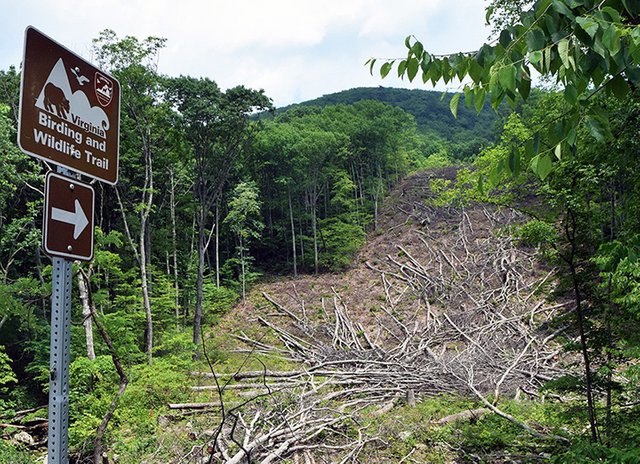Atlantic Coast and Mountain Valley Pipelines Lose Legal Ability to Construct
The 4th Circuit US Court of Appeals unanimously agreed to vacate two key permits for the Atlantic Coast Pipeline (ACP) Monday, August 6. This ruling follows a stop-work order issued to the Mountain Valley Pipeline (MVP) on Friday, August 3.
These two controversial fracked-gas pipelines were slated to carry marcellus shale gas from West Virginia through Virginia to North Carolina. There, they would connect with existing gas lines to transport the gas to export facilities.
The 4th Circuit threw out the ACP’s permit issued by the US Fish and Wildlife Service, as well as a permit from the National Park Service. The court criticized the Park Service, saying the issuance of that permit was “arbitrary and capricious”.
The first permit to be revoked involved the Park Service’s right-of-way issued to ACP for crossing the Blue Ridge Parkway. According to the Park Service, the Blue Ridge Parkway exists to “conserve the scenery and preserve the natural and cultural resources of the parkway’s designed and natural areas”. The court found this mission to be inconsistent with the issued right-of-way for the ACP.

(Trees felled to make way for the Atlantic Coast Pipeline. Photo source: Orin Langelle)
The second revoked permit was that of the Fish and Wildlife Service. The incidental take statement issued by the Fish and Wildlife Service did not provide adequate statistical evidence as to how endangered species would be protected from the ACP.
Under the Endangered Species Act, someone who knowingly kills an endangered species is “subject to substantial civil and criminal penalties, including imprisonment.” An incidental take statement can allow one to kill endangered species if they can specify “the impact, i.e., the amount or extent, of such incidental taking on the species.” The ACP failed to provide numerical evidence regarding endangered species that face extinction if the pipeline is allowed to destroy their habitats.
MVP construction was halted by the Federal Energy Regulatory Commission (FERC) on August 3 in part due to a separate 4th Circuit ruling last month. The Court found that the US Forest Service had bowed to MVP regarding control of erosion from construction in Jefferson National Forest.
The Forest Service had found that MVP’s erosion control methods would be 48% effective. MVP said the project could fail if that number were accurate, and coerced the Forest Service into changing the numbers. The Forest Service then accepted MVP’s “alternative” figure of 79% effectiveness.

(Peters Mountain, Where MVP planned to drill under the Appalachian Trail. Photo Source: The Roanoke Times)
The court called these actions “capitulation” and revoked the Forest Service permit as well as the Bureau of Land Management’s right-of-way permit for MVP in Jefferson National Forest.
One week after that decision, the FERC ordered MVP to stop work along the entire proposed pipeline route. A similar order to halt the ACP is now expected from the FERC.
In a statement, MVP claimed that construction would continue, saying “We look forward to continuing the safe construction of this important infrastructure project.”
A spokesman for the ACP similarly claimed that ACP construction could continue in some areas, saying “We will continue making progress with construction in West Virginia and North Carolina.”
Congratulations @holdendeeznews! You received a personal award!
You can view your badges on your Steem Board and compare to others on the Steem Ranking
Do not miss the last post from @steemitboard:
Vote for @Steemitboard as a witness to get one more award and increased upvotes!